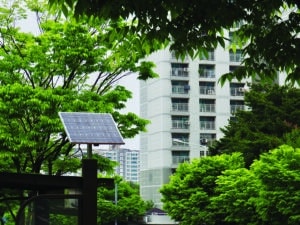
State and local policymakers are driving change forward at a rapid clip, asking the real estate and building industry to embrace change. iStock photo
We are experiencing a sea change in regulations related to sustainability and decarbonization in the built environment.
A few examples impact businesses and real estate in our state. In March 2021, just three years ago, Gov. Charlie Baker signed bill S.9, An Act Creating A Next-Generation Roadmap for Massachusetts Climate Policy. The law amended the 2008 Global Warming Solutions Act and statewide greenhouse gas emissions limits for 2030, 2040 and 2050. The 2021 law also required the creation of the Specialized Opt-in Stretch Energy Code, and various other initiatives in support of achieving net zero by 2050 for the commonwealth.
There’s even more going on at the local level. Prior to the 2021 climate bill, many municipalities in Massachusetts and beyond were already developing climate action plans and resiliency plans to address the realities of climate change and the need to mitigate and adapt.
Four big things happened in 2019. Brookline became the first East Coast town to vote to ban fossil fuel hookups in new buildings (which would eventually become allowable under a multi-town pilot authorized by state legislators in 2022). Somerville published its extensive zoning ordinance update to include requiring LEED Platinum certification for labs and net zero energy for many other building types. Boston updated its climate action plan while launching its Zero Net Carbon Building Zoning initiative.
And, in a conference room in downtown Boston, a group of building owners, designers, nonprofits and municipal leaders gathered somewhat quietly to begin drafting a preliminary “zero energy” stretch code proposal to advocate for its role in supporting the commonwealth’s 2050 carbon-reduction goals.
This industry-led proposal would later inform the Specialized Opt-in Stretch Energy Code required as of July 2023 and the creation of a Stretch Energy Code Technical Advisory Committee (SE-TAC) for continuous industry feedback to policy makers.
Was I in that conference room? Absolutely. Jazzed and inspired – probably not the typical experience when talking about code-writing – and ready to change the world. I blame the disruptor economy.
Fast forward back to today: Changing the world takes a lot of time. Despite the overall agreement that the regulatory landscape is changing rapidly, it took four or more years to arrive at the adoption of the Specialized Energy Code from the 2019 conference room to the 2023 enaction date.
Municipalities are developing decarbonization policies and zoning ordinance updates that take years to implement. And once these changes are in place, we learn even more about what works and what doesn’t as the implementation process in building design and construction begins. Policymakers and advocates are asked to be patient for radical change, and the real estate world and building industry is asked to embrace change at a pace that doesn’t always align to the realities of building development and construction.
A Huge Change in Regulation
Are codes, standards, and zoning ordinances getting it 100 percent right at the moment? It depends on who you ask! What I am confident in knowing is that we are collectively moving through a paradigm shift that I could not have imagined 20 years ago when LEED was just beginning to be adopted into the regulatory scene.
Meaningful decarbonization – and its contribution to a resilient economy and a healthy society – demands a more targeted and robust approach.
Some of this targeted work is captured in the Massachusetts building industry today. Watertown was the first to adopt the Specialized Opt-in Code, Boston is finalizing compliance processes for the BERDO program that aims to achieve zero emissions from buildings by 2050, Cambridge is updating its similar BEUDO program with even more near-term zero emissions targets and Newton now requires an embodied carbon life-cycle assessment study within its Sustainable Development Requirements.
What does this mean for new real estate developments, conversions, upgrades and new building designs? And what does it portend for business in Massachusetts overall?
In a world of ever-increasing technical demands, I would propose that our building planning, policy and design solutions benefit from technical leadership. Co-authored design proposals that leverage the experiential wisdom of architects alongside the technical innovation of engineers and top construction experts can become the norm. Decarbonization plans for implementation are best led by subject matter experts and engineers rather than management consulting firms. And codes and zoning ordinances benefit significantly from technical input and industry leadership.
A key takeaway is that for business leaders, investors, developers, financers and institutions alike, there’s an expanding opportunity to establish a cutting-edge, enduring built environment that doesn’t just meet these new codes – they can also point the way to shared value and a sustainable future.
Julie Janiski is a partner at Buro Happold and leads integrated teams of engineers, designers, analysts, and subject-matter experts to support a broad range of sustainability goals.




 |
| 
